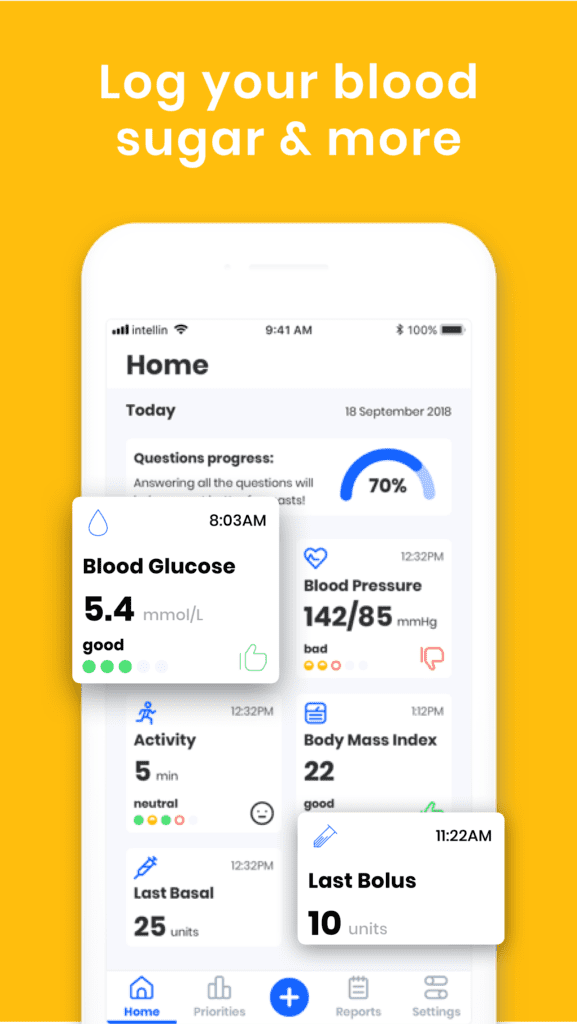
The Intellin® app by Gendius is designed to gather disease-specific information from Diabetes patients and identify personal areas of risk. In this interview, CEO Rory Cameron discusses how healthcare data can contribute to the early identification of risk factors and save patients lives.
Let’s begin with some background about Gendius. How did it start and how has it evolved so far?
My background is in pharmaceuticals. I spent many years working and leading various pharmaceutical companies. Six years ago, my colleague, Chris, was diagnosed with diabetes. At the time, he was working for a pharmaceutical company that sold diabetes drugs, so he was having discussions with professionals about diabetes practically every day. If anyone could manage diabetes, it would be him. It was his experience that led us to start moving into digital health together.
Quite soon into that journey, he had his first diabetic foot ulcer. The chances of staying alive five years after having a first diabetic foot ulcer are about 50%. It just transforms your outlook in terms of where you’re going. Since then, he’s had a mild heart attack as well. He was then prescribed a whole suite of drugs and changes he should be making to protect his heart.
That raised a lot of questions about how it could have been identified earlier. It was with all those questions that we set up the company with a mission to transform the way we manage and understand the complications of chronic disease.
Today, our business has two sides. One is the Intellin® platform and the other is the algorithms that we’re developing. At some point next year, we will look to embed some of those algorithms into our own platform, as well as other platforms.
Our main focus at the beginning was diabetes, but we’re now looking at chronic kidney disease and cardiovascular disease as well. What most people don’t know is that these diseases cause a whole load of other complications. We wanted to understand this better and to be able to flag patients earlier so we could help with early interventions. Our mission is to prevent the complications of chronic disease.
We started off by speaking to various patient groups and ended up developing an app-based platform that would try to make living with diabetes a little easier.
Lately, we’ve been moving into the whole area of risk prediction, which is a really exciting part of where Gendius is going. We are now looking at nearly 60,000 health records including retrospective datasets over a 10 year period. We are trying to find the metabolic markers that may predict if someone is going to have chronic kidney disease or cardiovascular disease over the next one to five years. Early identification enables early intervention and hopefully prevents some of these complications from occurring.
Currently, we are working with AstraZeneca to release our platform in the Gulf region. We also have a global project with them that is looking at chronic kidney disease risk.
What can you tell us about your Intellin® platform?
Intellin® tries to make it as easy as possible for individuals to track their health data. Healthcare professionals can see and pull information about their patients directly from the patient’s app, which is receiving data from other apps like Strava, Fitbit, Apple Health Kit, and medical devices such as blood pressure cuffs, Wi-Fi enabled scales, and anything to do with the metabolics that impact diabetes and can be collected easily and accurately. We’ve connected over 150 different devices and apps and we keep adding new ones every month to expand the capabilities even more.
In the UK, for instance, we can connect that dashboard with a patient’s electronic health record. We all know this frustration of not being able to access our health records when and where we need them. The ability to pull through anything, from cholesterol to blood pressure levels, or other tests you might be taking every year, can be life-changing.
Chris talks a lot about this. He gets up in the morning and goes on his digital scales. He also has a Continued Glucose Meter (CGM) and a blood pressure cuff connected as well. He just has to open the app, and all the information is there in one place.
We have a whole host of clinically validated bits of information that we share with the patients against the areas where they are out of scope. Patients who score abnormally high or low against a set of clinical guidelines get flagged.
The guidelines say things like if you’ve had a foot ulcer before, you’re at a very high risk of having another one. We tell individuals if they are within the guidelines or above them. We’re unique because we are capturing metabolic areas that are much broader than exercise and diet.
Diabetes is the number one cause of kidney failure worldwide, the number one cause of blindness, and the number one cause of lower limb amputation. It increases the risk of having a heart attack or a stroke by about two and a half times as well.
A lot of people watch their weight because being overweight is linked to type two diabetes. Those are interesting things at the beginning when you want to prevent people from getting diabetes or even reverse it very early on. They are not so interesting when someone has been on that journey for 5-10 years.
We don’t want people in Chris’s position to have early-stage kidney failure and then be told what they could have done earlier on. We want to give them the ability to know what they are up for early enough so they can do something about it.
Here’s a quick preview of the Intellin® app:


What kind of insights does your platform produce?
To understand a ten-year trend, we’d need to have your platform out on the market for about 20 years until we got enough people using it continually. Instead, the algorithms we’ve developed are based on historical datasets.
Now, we are at a point where we’re starting to collect a lot of prospective, real-time data from patients. By midway next year, we expect the amount of data we’ve collected through the Intellin® platform to outgrow the historical data that we started off with. I think that’s going to make it even more interesting.
The insights we see enable us to help patients who are at risk of having an early-stage chronic kidney disease. Currently, most risk calculators in chronic kidney disease tell you about the end-stage disease, when it’s too late to really do any prevention.
What we’re starting to see now in the data is the ability to predict who’s likely to get early-stage kidney disease. For instance, it is well documented in the literature that blood pressure has a detrimental effect on your kidneys. If someone is in that risk category, and their blood pressure is high, there’s an even bigger reason to tell them to maintain or maybe more aggressively manage their blood pressure.
How do you monitor a patient’s progress?
This comes on to the next stage, which we haven’t done yet.
The current risk models on the marketplace are snapshot models. If I look at your cardiovascular disease risks today, I can tell you your risk of having a fatal or nonfatal heart attack or stroke over the next 10 years.
What I can’t tell you is what happens if you change your habits, lose weight, or go on medication. Any changes you’ve made can impact your risk score, but those models just aren’t available yet. That is the next phase of what we’re doing, understanding the risk impact and modeling hypothetical interventions.
In the UK, when you’re 40, you get invited to your doctor and they do loads of tests including cardiovascular disease risk. Then they’ll tell you that you need to lose weight or exercise more. My first question, when I was given that test was what’s the impact if I do this? Of course, the doctor couldn’t tell me that. Instead, he made me 10 kilos lighter on his system and recalculated my score. Obviously, that is not how statistical models work.
That’s the bit we’re trying to answer now using new novel statistical models to understand the impact of change. That becomes really exciting because it’s the bit that everyone wants to know. That’s the next phase which we’re starting next year.
What do you think is required to standardize the use of AI in healthcare?
When we first developed our algorithms, we used a lot of clinical data to understand that position because they have to be clinically validated. But strangely, the more clinical data you use, the harder it is for the patient to access it because they need to have a lot of tests.
If you want intervention to happen earlier, you need to find non-clinical markers that are widely available. You can use age, BMI and exercise, and then glucose level and blood pressure meters, which are getting pretty well available to a lot of people now.
So many people are sharing data anyway now, whether it’s on their Apple Watch or other apps and gadgets. All we do is get their permission once, and then our software runs in the background and collects routine data.
What we’ve started to do recently with AstraZeneca is look at more simplified versions of that model. We’re looking at 4-5 inputs that any patient can capture. The algorithm might be slightly less sensitive, but it would be easier for people to use and far more accessible.
Making it easier and more accessible is also about allowing our algorithms to be embedded into other platforms, and that is another driver for accessibility.
If you really want everyone to use it, you need to give it in a way that people are going to be able to come in contact with it. So, rather than saying, this is our algorithm and if you want to use it, get our Intellin® app, we let customers license the algorithm and embed it into their own systems.
Earlier intervention or earlier identification is great, but only if you can save money for the system. Particularly in the area of diabetes, there are SGLT2 drugs now which are protective of the kidneys and the heart. The issue there is identifying which patients would benefit from those drugs early on. As soon as risk is identified, we flag the doctor, who now has a solution that is cost-effective and is going to save lives. That’s what I consider a real winner.


